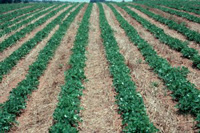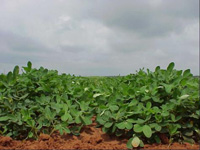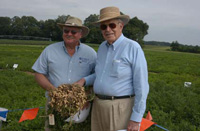On-Farm Demonstration/Evaluation Trials of Nematode 'Tolerant' Peanut Varieties in Florida
Project description and objectives:
Peanut root-knot nematode Meloidogyne arenaria race 1 is a major disease-causing agent which is present in greater than 90% of the Florida peanut fields and in sufficient populations to result in economic damage in 50% of these fields. Based on current acreage and yield data, identification and adoption of a nematode tolerant peanut variety (s) could potentially increase total Florida peanut production by over 18 million pounds without any additional cost of production. This potentially represents an approximate $4.5 million of additional revenue for Florida peanut producers.
in sufficient populations to result in economic damage in 50% of these fields. Based on current acreage and yield data, identification and adoption of a nematode tolerant peanut variety (s) could potentially increase total Florida peanut production by over 18 million pounds without any additional cost of production. This potentially represents an approximate $4.5 million of additional revenue for Florida peanut producers.
Recent research has identified some new peanut varieties with nematode ‘tolerance’. This project was designed to introduce and educate peanut growers about these varieties and demonstrate the potential yield benefits available through incorporation in fields with moderate to high incidence of the peanut root-knot nematode, Meloidogyne arenaria.
The objectives of this project were to:
1. To demonstrate through large scale grower field trials, yield differentials among nematode tolerant and non-tolerant varieties.
2. To determine growth and yield of these varieties under actual grower practices and pest pressures, as well as the economic advantages of utilizing these nematode tolerant varieties.
3. To familiarize growers with these newer varieties and communicate advantages of growing nematode tolerant peanut varieties to improve yield and economics in Florida peanut production.
4. Develop extension programs that focus on realistic IPM recommendations that can improve the profits of Florida peanut producers through reduced pest management costs which in turn will assist in reducing the environmental impact throughout the peanut production area.
5. To further screen existing cultivars, advanced breeding lines and early generation breeding lines for root-knot tolerance in known high Meloidogyne arenaria population sites.
Project activities:
Replicated large scale on-farm demonstration/research plots were established in a known high incident field in June 2007 in Columbia County. The plots were designed in a split plot design with 3 varieties X 4 nematicide treatments. Each treatment within the trial was 1.20 acres in size in order to facilitate realistic farm practice production and harvesting by the farm co-operator. One of the three varieties in the plots has a high level of peanut root-knot resistance but lacks resistance to Tomato Spotted Wilt Virus (TSWV), White Mold and various other serious fungal peanut plant pathogens. A second variety was one which recently had been identified as having some ‘tolerance’ to M. arenaria. The third variety was the current industry standard which comprises approximately 55% of the medium maturity peanut acreage today as the comparison.
Adjacent to the large scale plots, 229 small plots of advanced breeding lines and cultivars and 144 plots of early generation breeding lines were planted in the field.  Many of the breeding lines being tested had either COAN or NemaTAM as a parent. Both of these lines have a high level of nematode resistance, but are very susceptible to TSWV. Our goal is to develop a variety with resistance to both TSWV and root-knot nematode. The lines were rated for nematode damage and plants were selected for testing in 2008. In the case of the 144 early generation breeding lines, a second set was evaluated for resistance to TSWV in Marianna, Florida on the North Florida REC.
Many of the breeding lines being tested had either COAN or NemaTAM as a parent. Both of these lines have a high level of nematode resistance, but are very susceptible to TSWV. Our goal is to develop a variety with resistance to both TSWV and root-knot nematode. The lines were rated for nematode damage and plants were selected for testing in 2008. In the case of the 144 early generation breeding lines, a second set was evaluated for resistance to TSWV in Marianna, Florida on the North Florida REC.
Project accomplishments:
An On-Farm Peanut Growers Twilight Tour was held during the growing season to discuss the trials and educate the 35 participating area producers regarding the merits of genetic tolerance to major yield suppressing plant pathogens.
Growers were able to see the varieties in the field and visually compare growth habits, cultivar disease resistance differences and other agronomic characteristics associated with each. The presentations and handouts focused on realistic IPM concepts that can improve the profits of Florida peanut producers through reduced pest management costs, which in turn will assist in reducing the environmental impact throughout the peanut production area.
The project was also presented as an educational update as part of the Florida Peanut Field Day held at the North Florida Research and Education Center – Marianna. The Peanut Field Day presentation was attended by over 120 growers and industry clientele from Florida, Georgia and Alabama.
Unfortunately, drought conditions during the 2007 growing season so severely restricted yield potential of all varieties in the trial that the yield and grade data were not usable. All cultivar yields were drought suppressed to less than 30% of “average” yields for the field.
Notwithstanding the unfortunate results from the 2007 grower field trial, data from previous small plot trials and a preliminary grower field trial conducted in 2006 were given at the grower field days, and this data will be used to further grower awareness of the potential use of tolerant peanut varieties. In fact, grower interest has increased in the concept of variety tolerance based on the number of inquiries since the tour and field day presentations. The interest is primarily due to a no net cost for the producers and ease of implementation as identified cultivars become available.
Beyond the educational impact on peanut growers, the small plot component of the project had impact on developing new peanut varieties. The ability to screen breeding lines for nematode resistance in the field is a very valuable part of the plant breeding process. This project assisted in developing future peanut varieties with resistance to root-knot nematode.
Project leaders:
- William D. Thomas, Extension Agent IV Agronomy, Columbia County Extension
- Dr. Barry Tillman, Assistant Professor of Agronony, North Florida Research and Education Center, UF/IFAS
- Dr. Jimmy Rich, Nematologist, North Florida Research and Education Center, UF/IFAS